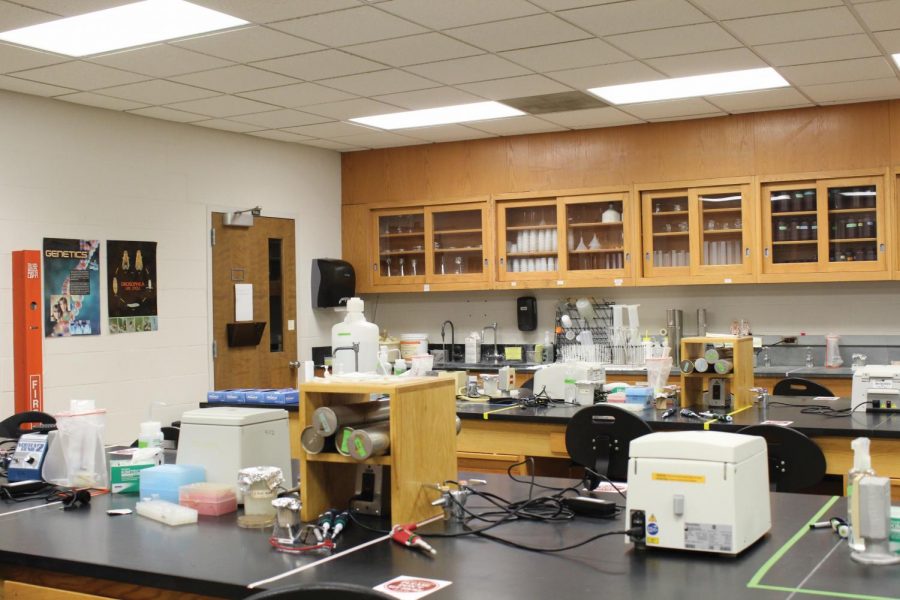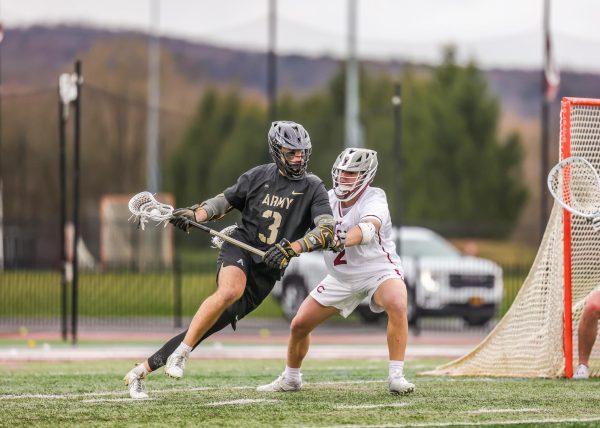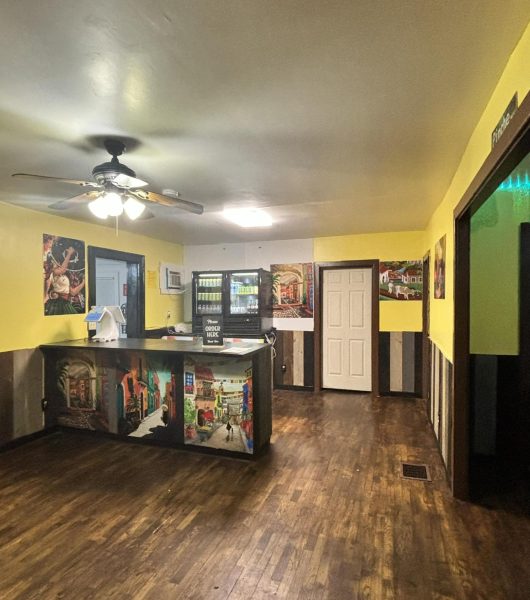Departments Prepare For Transition to Remote Learning
As students pack their bags and return home for Thanksgiving recess, Colgate professors teaching hybrid and in-person classes so far this semester are preparing to transition to fully virtual instruction. Though some departments remain relatively unaffected by the change, faculty within lab science and studio art settings must find new ways to deliver traditionally hands-on material.
Students will receive their last day of on-campus instruction on Friday, Nov. 20, with residence halls closing at noon on Sunday, Nov. 22. Following Thanksgiving recess from Sunday, Nov. 22 through Sunday, Nov. 29, instruction will resume fully virtually on Monday, Nov. 30.
To support faculty with the transition to remote learning at the end of the Spring 2020 semester, the University created the Task Force on Remote Learning, consisting of 15 faculty and students from various departments. Task force co-Chair Eddie Watkins, a Professor of Biology, and Director of the Center for Learning, Teaching and Research (CLTR) commented on the challenges facing virtual instruction in the upcoming weeks.
“Remote learning is not just about taking your syllabus and saying, ‘I’m going to record some lectures.’ It’s not that simple,” Watkins said. “I don’t think any [department] has been spared from this. But any sort of class that relies on real hands-on material, like passing around a rock in geology or looking under a microscope, those things are particularly challenging. How on Earth do you do chemistry or a painting class?”
According to Watkins, a survey conducted by the Task Force on Remote Learning revealed that students and staff expressed consistent concerns around lab sciences and the arts. Despite their worries, Watkins felt that both disciplines approached hybrid learning with a strong sense of community and creativity.
The Department of Chemistry is one discipline that navigated the balance between in-person research, academic study and lab experiences. According to Laboratory Instructor in the Department of Chemistry Patricia Jue, who was charged with coordinating organic labs, planning for the return to virtual learning after Thanksgiving began in August. Unlike the Spring 2020 semester when in-person lab instruction was unexpectedly interrupted, Jue could anticipate the return to virtual learning. Accordingly, Jue concentrated “wet” chemical activities and hands-on, experimental work towards the beginning of the semester, with computer-based data collection and analysis occurring after the Thanksgiving recess.
“I pretty much have the freedom to decide what experiments we would use, and so we did move some of the experiments around. There was one experiment where students spend a large amount of time analyzing it as groups of four to six students, so we just got rid of it because there was no way of recreating that experiment without students working close together,” Jue said.
Considering her preparation for the semester, Jue did not feel that the coronavirus pandemic heavily impacted organic labs. Sophomore Katia Jacovides, who was enrolled in an organic lab this semester, felt similarly.
“I think so far, lab has been organized really well, and I’m really happy that we were able to have in-person labs this far. I’m not nervous to do organic labs online because last semester, when general chemical labs were online, they gave us very detailed instructions that were easy to understand,” Jacovides said.
The Department of Biology took a similar approach, using the post-Thanksgiving Recess period as a time for data analysis and emphasis on final papers, posters and presentations.
Department Chair and Professor of Biology Frank Frey is having his upper-level lab courses use the period to present students’ investigative projects over Zoom, while students in his BIOL 182: Molecules, Cells and Genes will participate in a genetics experiment with fruit flies using a computer simulation program. In an in-person semester, the same problem-solving experiment would be performed.
Professor of Biology Ken Belanger planned a similar strategy within his senior seminar students, using the online period to discuss and reflect on their application of integrative science in “emerging topics” research papers. In the second week after Thanksgiving Recess, his students will give presentations over Zoom.
“The Biology Department has long planned for this remote period in all of our courses, and while there are undoubtedly challenges to remote learning, we’ve tried to make the upcoming transition as seamless as possible for our students,” Frey said.
According to Watkins, the department condensed some in-person labs and reduced the number of labs performed over the semester by one. The Department of Biology accompanied hands-on experimentation with asynchronous material.
Students within the Department of Art and Art History will similarly wrap up final projects in the weeks following the Thanksgiving recess. According to Assistant Professor of Art Yi Cui, students in her Video Art and Introduction to Studio Art classes will focus on their final project, having already submitted their outlines. The period following Thanksgiving will focus on class discussion, brainstorming sessions and individual feedback over Zoom. Students in Cui’s film class checked out the University’s equipment, while students in her art class will use objects from home for their found-object sculpture. According to Cui, other colleagues have mentioned giving their students feedback on final projects once classes move online.
Sophomore Charlotte Reaman, enrolled in another section of Introduction to Studio Art, plans to work on her final drawing after the recess, creating a self-portrait on a 30 by 40-inch board. Reaman expressed concern over potential distractions at home, explaining that her in-person instruction motivated her to draw. Despite her concerns, Cui believes that virtual learning might benefit students’ creativity.
“I’m not concerned. When students are on-campus, the materials they can collect are actually very limited,” Cui said. “But once they’re home, culturally, they’re actually in a [richer] environment. I think we could turn this restraint into something positive.”
According to Watkins, the Task Force on Remote Learning plans to virtually welcome the author of “Hybrid-Flexible Course Design: Implementing Student-Directed Hybrid Classes” Brian Beatty for a discussion in early December. The task force will host the event for interested faculty, following the conversation with a round table about teaching methods that were successful or unsuccessful heading into the Spring 2021 semester.







